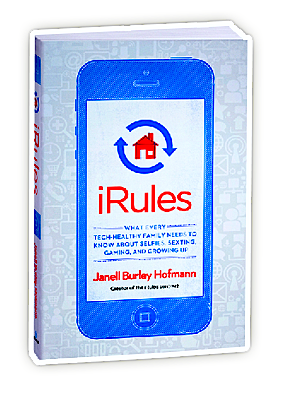Kids & Tech: Parent and Teacher Attitudes Differ
iRules: What Every Tech-Healthy Family Needs to Know about Selfies, Sexting, Gaming, and Growing up
By Janell Burley Hofmann
(Rodale Books, 2014 – Learn more)

In Janell Burley Hofmann’s book iRules: What Every Tech-Healthy Family Needs to Know about Selfies, Sexting, Gaming, and Growing up, technology functions like a magnet: both attracting and repelling the author.
Hofmann’s work is full of push/pull tensions: connecting online vs. connecting in the world; maintaining boundaries and privacy vs. sharing publicly; wanting to be entertained online vs. needing to engage with tangible things; sharing and viewing appropriate vs. inappropriate content; learning with technology vs. learning without technology; bringing technology in vs. keeping it out.

Fans of lists and how-tos will enjoy the format Hofmann and her publisher have chosen. Parents (the prime demographic target of the book) can take or modify her lists of steps to be a more technology conscious household.
In December of 2012, Hofmann made headlines with an 18 point contract — a contingency for her son’s new iPhone Christmas present. The book begins with the reprinted contract, each section modeled after one of the rules.
For example, the last rule reads: “Keep your eyes up. See the world happening around you. Stare out a window. Listen to the birds. Take a walk. Talk to a stranger. Wonder without googling.”
Hofman’s iRules, while at times limiting her son’s interaction with technology, here also implores him to live without it as well. Seemingly a member of Generation X, Hofmann remembers fondly her experiences sans technology and wants to make sure her kids experience this as well.
Positively tentative
While the tone of the book is both push and pull, Hofmann often settles on the push side of things. Technology has entered into our lives, so what are we going to do? How will we keep the kids safe? How will we keep them distraction-free at school? It seems like Hofmann ultimately sees technology in this book as positive, but tentatively so.
iRules is written for the wary; she wants parents and kids to embrace technology, but safely and carefully. And the rules are not just the kids. The book is as much a how-to for adult behaviors as it is a parent’s guide to finding an online/offline balance for children. She makes it clear that, “We are dealing with the influx of technology just like our kids.” For Hofmann, modeling AND guiding online/texting etiquette, screen use and social media go hand in hand.
Minding the teacher/parent gap
In my experience, parents are concerned about their children’s use of technology and their own use of technology. I, too, have these concerns as a parent. But reading this book through an education lens, I noticed something else: while parents are pushing technology away and trying to figure out how to limit its role in their children’s lives, teachers are doing almost the opposite.
While Hofmann states that she has “…never heard a parent…say that they wish their child had more time to play video games or text,” many teachers are searching for ways to “gamify” their classrooms in order to reach students. Teachers and administrators are looking to integrate and incorporate as much technology as possible and as fast as possible, to seamlessly blend digital tools and materials into every aspect of education. On purpose.
This dichotomy is implicit in the text, but clear: parents as a whole are pushing technology away, afraid of it for their children, while teachers are pulling technology in. There is an entire chapter devoted to parents whose children are using technology for school and varied reactions to iPads in the classroom. (The tone of that chapter settles on: iPads in the classroom/for homework= furrowed brows and consternation.)
While Hofman occasionally waxes poetic about the nostalgia of growing up in the world before the pre-Internet revolution, she does want parents to stop feeling guilty about technology and instead embrace it in a more purposeful way. As a parent, some of her lists and guidelines will be useful to me — to help begin conversations, to help navigate some of these more thorny tech issues.
But as a teacher, I think the last emotion I’ve been feeling about technology is guilt. And, if there is any guilt, it usually is because I haven’t been doing enough in the classroom. Clearly there are things I need I need to work on as a technological human, parent and teacher, but in the teaching world, it is hard to resist the more, more, more pull of the digital revolution.
Finding what’s best for kids
This dichotomy had never been so clearly elucidated to me as it was in iRules; parents and teachers are feeling very different about technology in our schools. Even teachers who are less inclined to embrace new technology in the classrooms are not eschewing it from a feeling of guilt.
Hofmann wants her son and her readers’ children to “Wonder without googling.” The education world, changing so much, has been trying so hard to get our students to do just that — google — and to develop the know-how and discernment to do it effectively. We have been changing pedagogy; trying, failing, and trying again to push our students to think critically. We are using the best practices we have, and we often do all this using technology.
So how can teachers and parents begin this conversation about our different approaches to technology? They push it away, we pull it in, but the bottom line is we ALL want what is best for the students. We are all models, we are all guides — parents and teachers — and we are along for the ride together.
Jody Passanisi is an eighth grade U.S. History teacher at an independent school in the Los Angeles area. She earned her teaching credential and an M.S. in education from Mount St. Mary’s College and an M.A. in religious studies from the Graduate Theological Union. Jody blogs at MiddleWeb’s Future of History. Folllow her and Shara Peters on Twitter @21centuryteachr.


































